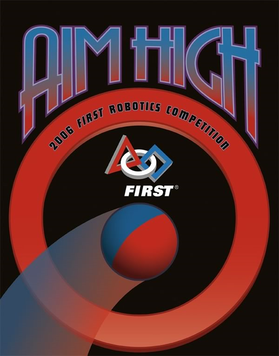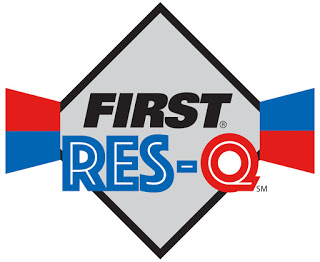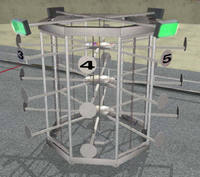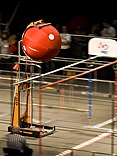
FIRST Frenzy: Raising the Bar was the 2004 game for the FIRST Robotics Competition. The game included elements from previous years' games, including mobile goals, "capping" goals with large inflatable balls, and others. In Raising the Bar, teams could score by having their human player score purple balls in any of the goals, capping the goals with a multiplier ball, or hanging their robot suspended from the 10-foot (3.0 m) high 'chin up bar'. In the qualifying matches, Teams competed in 2-member randomly generated alliances. In the elimination rounds, 3-member alliances competed against each other with one team sitting out each match. The alliance that won two matches advanced in the tournament.

Stack Attack was the game for the 2003 FIRST Robotics Competition. Two teams of two robots compete by moving large Sterilite bins into their zones and arranging them into stacks.

Aim High was the 2006 game for the FIRST Robotics Competition. The competition involved teams competing to gain points by delivering balls into goals and positioning their robots in certain positions on the playing field. The teams took it in turn to provide defense and attack.

Triple Play was the name of the 2005 season FIRST Robotics Competition game.

Hangin'-A-Round was the name of the robotics contest at the 2006-2007 FIRST Vex Challenge (FVC). The contest involved building a robot from a kit that could attain a higher score than the opposition by placing the softballs into the colored goals, possessing the “atlas ball”, and by being parked on the platform or hanging from the bar.

FIRST Overdrive was the 2008 game for the FIRST Robotics Competition, announced on January 5, 2008. In it, teams competed to complete counterclockwise laps around a central barrier while manipulating large 40 in (1 m) diameter "Trackballs" over and under overpasses to score additional points.

Half-Pipe Hustle was the first official FIRST Vex Challenge (FVC) game, taking place in 2005–2006. In this challenge, robotics teams built robots from the Vex design kit to compete in competitions across the United States and in other nations, in matches consisting of a 45-second autonomous period, followed by a 2-minute driver control period in which the robots are controlled by team drivers using remote controls.
Breakaway is the game for the 2010 FIRST Robotics Competition, announced on January 9, 2010. Robots direct soccer balls into goals, traverse "bumps" in the field, suspend themselves and each other on towers, and/or go through a tunnel located in the center of the field.

Logo Motion is the 2011 FIRST Robotics Competition game. Playing pieces are inner tubes shaped like the components of the FIRST logo. The primary objective of the game is to place them on racks to gain points. In the endgame, robots deploy smaller robots ("minibots") to climb a tower. Minibots must be made from the FIRST Tech Challenge kit of parts. The game celebrates the 20th season of the FRC and is also meant to commemorate the artist Jack Kamen, who designed the original FIRST logo.

Rebound Rumble is the 2012 FIRST Robotics Competition game. It is styled similarly to basketball.

Ultimate Ascent was the 2013 FIRST Robotics Competition game. It is styled similarly to disc golf.

Aerial Assist was the 2014 FIRST Robotics Competition game.

Recycle Rush was the 2015 FIRST Robotics Competition game. It involves picking up and stacking totes on scoring platforms, putting pool noodles ("litter") inside recycling containers, and putting the containers on top of scoring stacks of totes. There is also a coopertition aspect of the game where both alliances of teams can pool their totes and stack them on a step dividing the field to each gain twenty points. Along with these robot actions, human players can attempt to throw the pool noodles across the field to gain four points for each noodle left in the opposing alliance's work zone.
FIRST Stronghold was the 2016 FIRST Robotics Competition game. The game was played by two alliances of up to three teams each, and involves breaching the opponents’ defenses, known as outer work as well as capturing their tower by first firing "boulders" at it, and then surrounding or scaling the tower using a singular rung on the tower wall. Points were scored by crossing elements of the tower's outer works, shooting boulders into the opposing tower's five goals in order to lower the tower strength, and by surrounding and scaling the tower.

FIRST Res-Q, released on September 8, 2015, is the 2015–2016 robotics competition for FIRST Tech Challenge. In the competition, two alliances, each consisting of two teams, compete to climb a mountain and score debris in alliance specific goals. FIRST Res-Q is the eleventh FTC challenge game.

Destination: Deep Space, stylized as DESTINATION: DEEP SPACE and officially known as Destination: Deep Space Presented By The Boeing Company, is the FIRST Robotics Competition game for the 2019 season. It involves two alliances of three teams each, with each team controlling a robot and performing specific tasks on a field to score points. The game centers around an outer space theme involving two alliances consisting of three teams each competing to place poly-carbonate hatch panels and orange rubber balls or "cargo" on rockets and cargo ships before returning to their HAB platform to climb at the end of the match.

Infinite Recharge is the FIRST Robotics Competition (FRC) game for the 2020 season. The season is in partnership with Lucasfilm as part of its Star Wars: Force for Change initiative.

Rapid React, stylized as RAPID REACT and officially known as Rapid React presented by The Boeing Company for sponsorship reasons, is the FIRST Robotics Competition (FRC) game for the 2022 season. The game is themed around transportation as part of the FIRST-wide FIRST Forward theme for 2021-2022.

Charged Up, stylized as CHARGED UP and officially known as Charged Up presented by Haas for sponsorship reasons, was the FIRST Robotics Competition game for the 2023 season. The game is part of the FIRST-wide FIRST Energize theme for the 2022-2023 season, which focuses on energy and sustainable development. The season's kickoff event occurred on January 7, 2023, and was streamed live on Twitch.

Crescendo, stylized as CRESCENDO and officially known as Crescendo presented by Haas for sponsorship reasons, was the FIRST Robotics Competition game for the 2024 season. The game is themed around music and concerts as part of the overall 2023-2024 FIRST in Show season. The game's kickoff event occurred on January 6, 2024, and was streamed live on Twitch.






















